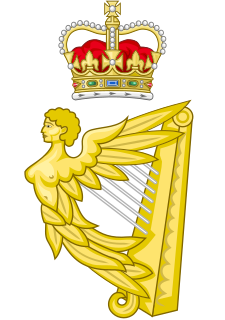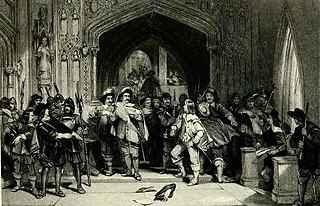Related Research Articles

The Commonwealth was the political structure during the period from 1649 to 1660 when England and Wales, later along with Ireland and Scotland, were governed as a republic after the end of the Second English Civil War and the trial and execution of Charles I. The republic's existence was declared through "An Act declaring England to be a Commonwealth", adopted by the Rump Parliament on 19 May 1649. Power in the early Commonwealth was vested primarily in the Parliament and a Council of State. During the period, fighting continued, particularly in Ireland and Scotland, between the parliamentary forces and those opposed to them, as part of what is now referred to as the Third English Civil War.

The English Civil War (1642–1651) was a series of civil wars and political machinations between Parliamentarians ("Roundheads") and Royalists ("Cavaliers") principally over the manner of England's governance. The first (1642–1646) and second (1648–1649) wars pitted the supporters of King Charles I against the supporters of the Long Parliament, while the third (1649–1651) saw fighting between supporters of King Charles II and supporters of the Rump Parliament. The war ended with Parliamentarian victory at the Battle of Worcester on 3 September 1651.

The Fifth Monarchists or Fifth Monarchy Men were an extreme Puritan sect active from 1649 to 1660 during the Commonwealth, following the English Civil Wars of the 17th century. They took their name from a prophecy in the Book of Daniel that four ancient monarchies would precede the kingdom of Christ. They also referred to the year 1666 and its relationship to the biblical Number of the Beast indicating the end of earthly rule by carnal human beings. They were one of a number of nonconformist dissenting groups that emerged around this time.

The Long Parliament was an English Parliament which lasted from 1640 until 1660. It followed the fiasco of the Short Parliament which had convened for only three weeks during the spring of 1640, and which in turn had followed an 11-year parliamentary absence. In September 1640, King Charles I issued writs summoning a parliament to convene on 3 November 1640. He intended it to pass financial bills, a step made necessary by the costs of the Bishops' Wars in Scotland. The Long Parliament received its name from the fact that, by Act of Parliament, it stipulated it could be dissolved only with agreement of the members; and, those members did not agree to its dissolution until 16 March 1660, after the English Civil War and near the close of the Interregnum.

A monarchical system of government existed in Ireland from ancient times until—for what became the Republic of Ireland—the early twentieth century. Northern Ireland, as part of the United Kingdom, remains under a monarchical system of government. The Gaelic kingdoms of Ireland ended with the Norman invasion of Ireland, when the kingdom became a fief of the Holy See under the Lordship of the King of England. This lasted until the Parliament of Ireland conferred the crown of Ireland upon King Henry VIII of England during the English Reformation. The monarch of England held the crowns of England and Ireland in a personal union. The Union of the Crowns in 1603 expanded the personal union to include Scotland. The personal union between England and Scotland became a political union with the enactments of the Acts of Union 1707, which created the Kingdom of Great Britain. The crowns of Great Britain and Ireland remained in personal union until it was ended by the Acts of Union 1800, which united Ireland and Great Britain into the United Kingdom of Great Britain and Ireland from January 1801 until December 1922.

The Protectorate was the period during the Commonwealth when England and Wales, Ireland, Scotland, and the English overseas possessions were governed by a Lord Protector as a republic. The Protectorate began in 1653 when, following the dissolution of the Rump Parliament and then Barebone's Parliament, Oliver Cromwell was appointed Lord Protector of the Commonwealth under the terms of the Instrument of Government. In 1659, the Protectorate Parliament was dissolved by the Committee of Safety as Richard Cromwell, who had succeeded his father as Lord Protector, was unable to keep control of the Parliament and the Army. This marked the end of the Protectorate and the start of a second period of rule by the Rump Parliament as the legislature and the Council of State as the executive.

Pride's Purge was an event that took place in December 1648, during the Second English Civil War, when troops of the New Model Army under the command of Colonel Thomas Pride forcibly removed from the Long Parliament all those who were not supporters of the Grandees in the New Model Army and the Independents. Some have called it a coup d'état.

The Rump Parliament was the English Parliament after Colonel Thomas Pride purged the Long Parliament, on 6 December 1648, of those members hostile to the Grandees' intention to try King Charles I for high treason.
Republicanism in the United Kingdom is the political movement that seeks to replace the United Kingdom's monarchy with a republic. For those who want a non-hereditary head of state, the method by which one should be chosen is not agreed upon, with some favouring an elected president, some an appointed head of state with little power. Others support something akin to the Swiss model, with a directorate functioning as a collective head of state.

William Lenthall (1591–1662) was an English politician of the Civil War period. He served as Speaker of the House of Commons for a period of almost twenty years, both before and after the execution of King Charles I.

The Wars of the Three Kingdoms, sometimes known as the British Civil Wars, formed an intertwined series of conflicts that took place in the kingdoms of England, Scotland and Ireland between 1639 and 1651. The English Civil War proper has become the best-known of these conflicts; it included the abolition of the monarchy and the execution of the kingdoms' monarch, Charles I, by the English Parliament in 1649.
This is a timeline of events leading up to, culminating in, and resulting from the English Civil Wars.
The English Council of State, later also known as the Protector's Privy Council, was first appointed by the Rump Parliament on 14 February 1649 after the execution of King Charles I.
Events from the year 1649 in England.
"An Act prohibiting the proclaiming any person to be King of England or Ireland, or the Dominions thereof" purported to be an Act of the Parliament of England, enacted without royal assent on the same day as the execution of King Charles I of England on 30 January 1649, during the English Civil War. The purpose of the Act was to prevent the automatic succession of Charles's son as King, or the proclamation of another person as King. The monarchy was abolished shortly afterwards on 17 March 1649. Following the Restoration the Act was declared void because it had not received royal assent.

The Tender of Union was a declaration of the Parliament of England during the Interregnum following the War of the Three Kingdoms stating that Scotland would cease to have an independent parliament and would join England in its emerging Commonwealth republic.
The Ready and Easy Way to Establish a Free Commonwealth was a political tract by John Milton published in London at the end of February 1660. The full title is "The readie & easie way to establish a Free Commonwealth, and the excellence therof compar'd with the inconveniences and dangers of readmitting kingship in this nation. The author J[ohn] M[ilton]". In the tract, Milton warns against the dangers inherent in a monarchical form of government. A second edition, published in March 1660, steps up the prophetic rhetoric against a monarchy.

The Instrument of Government was a constitution of the Commonwealth of England, Scotland and Ireland. Drafted by Major-General John Lambert in 1653, it was the first sovereign codified and written constitution in England.
The Treasons Act 1649 or Act declaring what offences shall be adjudged Treason was passed on 17 July 1649 by the Rump Parliament during the Commonwealth of England. It superseded the Act declaring what offences shall be adjudged Treason passed about two months earlier on 14 May 1649.
References
- ↑ Worden, Blair (1974). The Rump Parliament 1648-1653 . Cambridge University Press. pp. 171–172. ISBN 978-0-521-29213-9.
- ↑ Journal of the House of Commons: volume 8: 1660-1667. 1802. pp. 16–18. Retrieved 31 December 2008.
- ↑ Porter, Eric: A Cloak for Knavery: Kingship, the Army and the First Protectorate Parliament 1654-55 The Seventeenth Century (17:2) Oct 2002, 187-205.